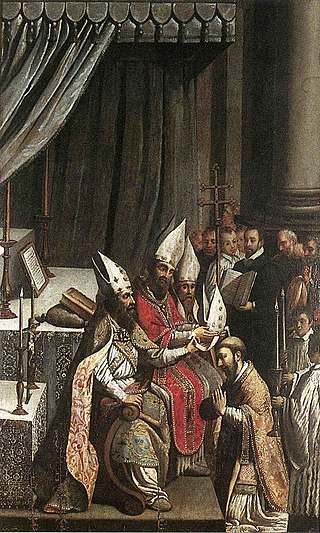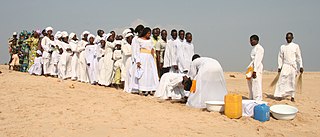
Apostolic succession is the method whereby the ministry of the Christian Church is considered by some Christian denominations to be derived from the apostles by a continuous succession, which has usually been associated with a claim that the succession is through a series of bishops. Those of the Catholic, Eastern Orthodox, Scandinavian Lutheran, Anglican, Oriental Orthodox, Church of the East, Hussite, Moravian and Old Catholic traditions maintain that "a bishop cannot have regular or valid orders unless he has been consecrated in this apostolic succession". These traditions do not always consider the episcopal consecrations of all of the other traditions as valid.
A bishop is an ordained member of the clergy who is entrusted with a position of authority and oversight in a religious institution. In Christianity, bishops are normally responsible for the governance and administration of dioceses. The role or office of the bishop is called episcopacy. Organizationally, several Christian denominations utilize ecclesiastical structures that call for the position of bishops, while other denominations have dispensed with this office, seeing it as a symbol of power. Bishops have also exercised political authority within their dioceses.

An episcopal polity is a hierarchical form of church governance in which the chief local authorities are called bishops. The word "bishop" here is derived via the British Latin and Vulgar Latin term *ebiscopus/*biscopus, from the Ancient Greek ἐπίσκοπος epískopos meaning "overseer". It is the structure used by many of the major Christian Churches and denominations, such as the Catholic, Eastern Orthodox, Oriental Orthodox, Church of the East, Anglican, Lutheran and Methodist churches or denominations, and other churches founded independently from these lineages.
Full communion is a communion or relationship of full agreement among different Christian denominations or Christian individuals that share certain essential principles of Christian theology. Views vary among denominations on exactly what constitutes full communion, but typically when two or more denominations are in full communion it enables services and celebrations, such as the Eucharist, to be shared among congregants or clergy of any of them with the full approval of each.
A pastor is the leader of a Christian congregation who also gives advice and counsel to people from the community or congregation. In Lutheranism, Catholicism, Eastern Orthodoxy, Oriental Orthodoxy and Anglicanism, pastors are always ordained. In Methodism, pastors may be either licensed or ordained.

In Christian denominations that practice infant baptism, confirmation is seen as the sealing of the covenant created in baptism. Those being confirmed are known as confirmands. For adults, it is an affirmation of belief. It involves laying on of hands.
A Christian denomination is a distinct religious body within Christianity that comprises all church congregations of the same kind, identifiable by traits such as a name, particular history, organization, leadership, theological doctrine, worship style and, sometimes, a founder. It is a secular and neutral term, generally used to denote any established Christian church. Unlike a cult or sect, a denomination is usually seen as part of the Christian religious mainstream. Most Christian denominations refer to themselves as churches, whereas some newer ones tend to interchangeably use the terms churches, assemblies, fellowships, etc. Divisions between one group and another are defined by authority and doctrine; issues such as the nature of Jesus, the authority of apostolic succession, biblical hermeneutics, theology, ecclesiology, eschatology, and papal primacy may separate one denomination from another. Groups of denominations—often sharing broadly similar beliefs, practices, and historical ties—are sometimes known as "branches of Christianity". These branches differ in many ways, especially through differences in practices and belief.

An African-initiated church (AIC) is a Christian church independently started in Africa by Africans rather than chiefly by missionaries from another continent.
Catholicity is a concept of pertaining to beliefs and practices that are widely accepted by numerous Christian denominations, most notably by those Christian denominations that describe themselves as catholic in accordance with the Four Marks of the Church, as expressed in the Nicene Creed formulated at the First Council of Constantinople in 381: "[I believe] in one, holy, catholic, and apostolic Church." The English adjective catholic is derived from the Ancient Greek adjective καθολικός, meaning "general", "universal". Thus, "catholic" means that in the Church the wholeness of the Christian faith, full and complete, all-embracing, and with nothing lacking, is proclaimed to all people without excluding any part of the faith or any class or group of people. An early definition for what is "catholic" was summarized in what is known as the Vincentian Canon in the 5th century Commonitory: "what has been believed everywhere, always, and by all."

More than 70% of the population of Botswana is Christian. Most are members of the Anglican, United Congregational Church of Southern Africa, the Methodist Church of Southern Africa, and African independent churches. Anglicans are part of the Church of the Province of Central Africa. The Roman Catholic Church includes about 5% of the nation's population.
The Convergence Movement, also known as the Ancient-Future Faith, whose foundation is primarily attributed to Robert E. Webber in 1985, is an ecumenical movement. Developed as an effort among evangelical, charismatic and Pentecostal, and liturgical Christians and denominations blending their forms of worship, the movement has been defined for its predominant use of the Anglican tradition's Book of Common Prayer; use from additional liturgical sources common to Lutheranism, Eastern Orthodoxy, and Catholicism have also been employed.
The Four Marks of the Church, also known as the Attributes of the Church, describes four distinctive adjectives of traditional Christian ecclesiology as expressed in the Nicene Creed completed at the First Council of Constantinople in AD 381: "[We believe] in one, holy, catholic, and apostolic Church."

Christianity is the most widely professed religion in Zimbabwe, with Protestantism being its largest denomination.
Apostolic Church may refer to:
Characteristic of Christianity in the 19th century were evangelical revivals in some largely Protestant countries and later the effects of modern biblical scholarship on the churches. Liberal or modernist theology was one consequence of this. In Europe, the Roman Catholic Church strongly opposed liberalism and culture wars launched in Germany, Italy, Belgium and France. It strongly emphasized personal piety. In Europe there was a general move away from religious observance and belief in Christian teachings and a move towards secularism. In Protestantism, pietistic revivals were common.

John or Johane Marange was a Zimbabwean apostolic leader, prophet, and founder of the Apostles of Johane Marange.
Articles related to Christianity include:








